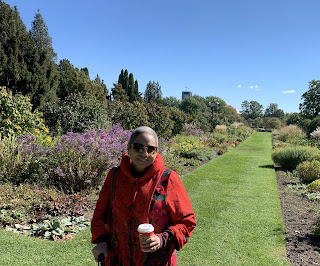Kidnapped
I was kidnapped today, as suggested earlier this week. My #EFIR (who retired, so is technically a #REFIR) who is also my sister-friend, came to collect me after her medical appointment, and we picked up coffee and pastries (I’m apparently very evil for taking her to pastry shops around the city and “forcing” her to eat desserts!) and settled onto a sunny bench at the Experimental Farm to picnic. It was a beautiful day, lovely and mild, and we enjoyed the time. The boys would have loved it too, so I’ll have to bring them on a nice day. Jerry had a brisk walk this morning, as it was somewhat chilly, but he just perked up and barked at everything that moved! Don is doing well, and laughed at my revolving door routine today — when I got back from my “kidnapping” another friend came to take me out to dinner. Delicious seafood pasta and we shared a decadent cheesecake for dessert. I’m home now, tired and achy, but very glad to have been out today. I woke up in a depression this morning, and was planning to stay in and mope, but I’m glad we went out and got some sunshine.
I’ve had the same conversation for the last few days, with different people, all unrelated. Talk turned, as it does, to inflation and the effect it’s having on the affordability of life. One of my neighbours commented that her practice (she works at a dental office nearby) lost a number of employees during the pandemic who haven’t returned. Then one of my support people talked about how they’re short staffed and it’s difficult to recruit people. It’s the same story in several fields — in the public sector, some managers are finding that their employees don’t want to return to the office; in restaurants, in retail… the list goes on. We’re trying to understand how people are surviving if they aren’t working. Government benefits during the pandemic were generous, but they won’t last — in fact, they’re probably expired by now. There’s only so much that’s available through vacation pay, and that’s probably been used up during the last 2 years, so we were curious about how people are managing. Apart from the issues of staffing (we won’t discuss healthcare in Ontario, which is just distressing) the increase in costs is outstripping wage growth.
That led, as it usually does, to the discussion that as late as the 1960s, it was possible to raise a family on a single income, including owning a home, even on minimum wage. That’s no longer possible for the overwhelming majority of the population. It’s also obvious that wages stagnated in the 1970s — minimum wage hasn’t kept pace with inflation, and other social benefits, like old age pensions, disability pensions, etc, are even further behind. In our discussion, we all seemed to agree that minimum wage should be sufficient to support someone who works full time. There’s no need for everyone to afford luxurious mansions, but if you work a 40-hour or more week, you should be able to buy food, pay rent, cover utilities, etc. There are far too many working poor who are being left behind. It’s a convenient lie to blame people for being indigent, or to say that they should learn to save, etc, but it’s probably far more accurate to say that they should be paid a living wage. I know, it’s expensive, and it’s hard on small businesses— which form the majority of job creators — but it’s also ridiculous that a single executive can earn 400 times what their average employee earns. It would be, in my opinion, preferable to have a more equitable distribution of wealth.
In an ideal world, food, medication, water, housing, education and heating/cooling should all be universally available, so nobody starves, nobody freezes to death, nobody loses their home in trying to protect their health, and everyone is literate, which leads to many other benefits. Can you imagine, for instance, a world in which electricity was freely available? That would reduce costs on so many goods and services and allow more funding for other things. Or banning the sale of water (that really hurts and annoys me!) so that clean water is available to everyone. Those would make it possible for an increase in the standard of living universally. Medications — especially for chronic conditions — should be inexpensive, because human life shouldn’t be reduced to financial considerations. That just says that the poor aren’t people, and that the wealthy are the only ones deserving of care.
Sorry for the soapbox again. It was just that I’ve had the same conversation 5 or 6 times in the last few days, and we were all worrying about the increasing cost of living, and the decline in the overall standards. Then I realized that I was not alone in imagining an ideal world, and it’s hard to feel comfortable when there are so many inequities. There’s more, which I may discuss in future posts, but for tonight I’ll just stop here and go play with y puppy and reduce my stress! Good night!



Comments
Post a Comment